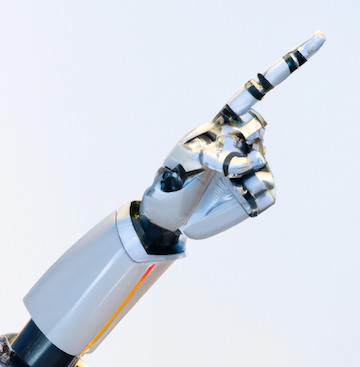Our first dog was a border collie. Border collies are canine Einsteins. She usually knew what I was going to do before I did. All I had to do was think about going for a walk and she’d jump up from where she was studying calculus or quantum physics or something, and grab her leash.
But she was slow to learn that fingers pointed at things. To be fair, hands often contain treats or toys, so it pays to keep an eye on them. It took me a long time to teach her to look where I was pointing, and I don’t think she was ever really comfortable with the idea.
People can be slow, too, and businesses doubly so.
Remember Kodak? The first portable digital camera was invented in 1975 by Steven Sasson of Eastman Kodak. It was never intended for production, but Kodak didn’t even try (then). They didn’t need to fool around with toys. They were on top of the world and practically synonymous with photography — remember the “Kodak Moment”? Even when other companies started selling digital cameras, the first models were laughably lame by comparison with film, so Kodak wasn’t worried.
Kodak filed for bankruptcy in 2012.
They should have looked where the technology was pointing, not where it was.
Remember Borders bookstores? They were great. Shortly before their demise I knew people who loved going there to flip through books and get ideas — and then they’d go home and order the same books for less from Amazon.
Remember Blockbuster?
Remember Tower Records?
It wasn’t competition that put them all out of business, it was technology. If they’d understood how the world was changing and changed with it, who knows if Amazon and Netflix and Spotify would have ended up on top?
What was it about digital photography, on-line book sales, and streaming media that changed the world out from under the industry leaders?
It was speed, convenience, cost, and (for books and media) an overwhelming superiority in variety.
All this is old news, so why bring it up now?
We’re at the start of a technology change an order of magnitude more significant than any of those. It just doesn’t look like it yet.
I’m talking about AI.
Over the past year we’ve seen an explosion of AI tools. AI is getting really good at:
- speech to text recognition (such as with OpenAI’s Whisper)
- object detection and recognition
- text to speech
- automated language translation
- text to image generation (as with like DALL-E, Stable Diffusion, and Midjourney)
- automated coding assistance (as with ChatGPT, GitHub Copilot, and many others)
- text completion (as with many of the GPT-3 follow-ons like ChatGPT)
In particular, OpenAI’s ChatGPT has stunned nearly everyone in the past months by what it can do. It can explain particle physics, create a recipe for chocolate chip banana cookies, or (as one viral tweet explored) “write a biblical verse in the style of the King James Bible explaining how to remove a peanut butter sandwich from a VCR”.
Perhaps the most impressive improvement in ChatGPT over earlier systems is that they’ve made it conversational — it doesn’t just respond to the last question or request. (It doesn’t actually “remember” what you’re talking about — the system just passes everything you’ve been talking about recently along with each new prompt. But if it walks like a duck and quacks like a duck…it’s a computer.)
As amazing as those things are, they’ve got huge problems and limitations.
- StackOverflow has temporarily banned answers from ChatGPT, after a flood of people posted answers to coding questions that looked correct, but weren’t.
- Most foreign language teachers can tell in an instant if a student has turned in homework produced by Google Translate.
- Artists generally produce better work than Stable Diffusion or DALL-E. If you have a budget for art, those systems might be a tool the artist uses but not the final result. (If you don’t have a budget and just want something quick, you can make a robot hand with DALL-E like I did above.)
- Models like ChatGPT can produce confident and convincing answers to questions — but sometimes the answers are completely made up and wrong.
- Perhaps most importantly, there are legions of legal and ethical questions about whether the companies making these tools are benefiting from the work of others without compensating them (and there are class action lawsuits in the works).
None of that is the point.
Or rather, none of that is where technology is pointing.
Remember: speed, convenience, cost, and an overwhelming superiority in variety — those are what destroyed the businesses that couldn’t adapt to change.
Those are also exactly what AI is changing about nearly everything.
As many people have said already, the genie is out of the bottle. Scientists and engineers all over the world are rapidly creating newer and better AI systems — and in many cases using AI to help them do that. Neither legislation nor anything else is going to slow that down.
AI isn’t coming to take our jobs, but it’s certainly going to change them. It’s going to change everything. And it absolutely will not stop.
Yes, there are many limitations and problems with these systems right now, but I think we should remember one thing:
Don’t look at the hand.





Use the share icon here if you liked it.
Thanks!